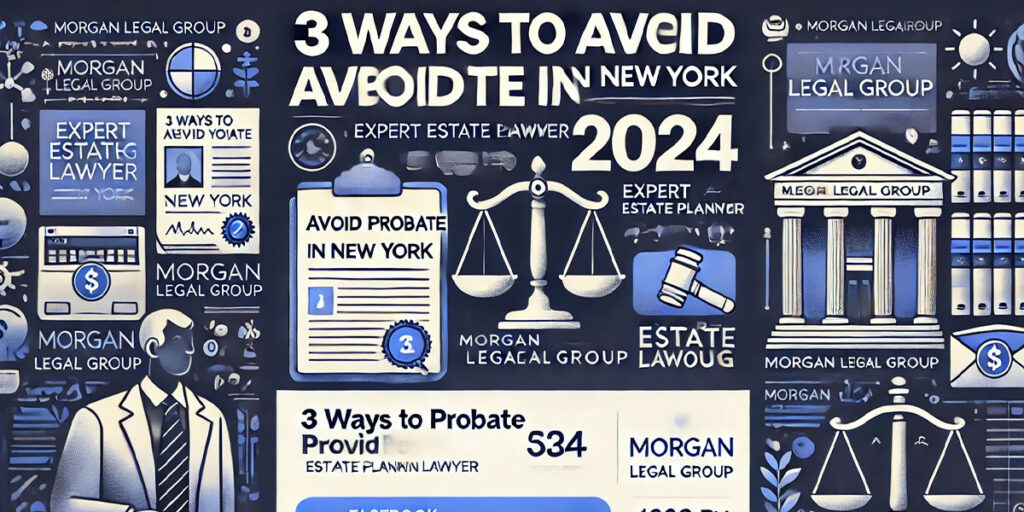3 Ways to Avoid Probate in New York 2024
Probate is a legal process that oversees the distribution of a deceased person’s assets. While it ensures that debts and taxes are settled, probate can be time-consuming, costly, and stressful for loved ones. Fortunately, New York law offers several strategies to bypass probate, providing your beneficiaries with a smoother and more efficient inheritance process. At Morgan Legal Group, we specialize in estate planning techniques that help individuals avoid probate and secure their legacies.
What Is Probate?
Probate is the court-supervised process of validating a will, settling debts, and distributing assets. New York’s intestacy laws dictate how assets are divided among heirs if the deceased did not leave a will. However, probate can present several challenges:
- It is often lengthy, taking months or even years to complete.
- It is public, meaning the estate’s details become part of the public record.
- It can be expensive, with court fees, legal costs, and executor fees reducing the estate’s value.
Many individuals turn to probate avoidance strategies to address these issues. Below, we outline three effective methods to avoid probate in New York in 2024.
1. Establish a Revocable Living Trust
How It Works
A revocable living trust is a legal arrangement where you transfer ownership of your assets to a trust during your lifetime. As the trustee, you retain control over the assets and can modify or revoke the trust as needed. Upon your death, the trust bypasses probate, and your designated successor trustee distributes the assets to beneficiaries according to your instructions.
Advantages
- Privacy: Unlike probate, a living trust is not subject to public records, keeping your financial affairs confidential.
- Efficiency: Assets held in the trust are distributed quickly, without the delays associated with probate.
- Flexibility: You can add or remove assets and update beneficiaries anytime.
Common Assets to Place in a Living Trust
- Real estate
- Bank accounts
- Investment portfolios
- Personal property of significant value
Working with an experienced estate planning attorney ensures your trust is properly drafted and funded, maximizing its benefits.
2. Joint Ownership with Right of Survivorship
How It Works
Joint ownership with right of survivorship allows two or more individuals to own property together. When one owner passes away, their share automatically transfers to the surviving owner(s), bypassing probate.
Common Types of Joint Ownership
- Joint Tenancy: This arrangement is often used for real estate and bank accounts. All owners have equal rights to the property, and the last surviving owner retains full ownership.
- Tenancy by the Entirety: Exclusive to married couples, this form of joint ownership provides additional legal protections, such as creditor protection for jointly owned property.
Benefits of Joint Ownership
- Simplicity: Property transfers automatically without court involvement.
- Cost-Effective: Avoiding probate reduces legal fees and administrative costs.
However, joint ownership requires careful consideration. Adding a co-owner to your assets could expose them to the co-owner’s creditors or legal disputes. Consulting an attorney ensures you fully understand the implications.
3. Designate Beneficiary Accounts
How It Works
Certain financial accounts allow you to name a beneficiary who will receive the funds directly upon your death, bypassing probate. These include:
- Payable-on-Death (POD) Accounts: Bank accounts that transfer to the named beneficiary upon your death.
- Transfer-on-Death (TOD) Accounts: Investment accounts that allow the transfer of stocks, bonds, and other securities.
- Life Insurance Policies: Proceeds are paid directly to the designated beneficiary.
Steps to Set Up Beneficiary Designations
- Contact your financial institution or insurance provider.
- Complete the necessary forms to name beneficiaries.
- Review and update beneficiary designations periodically to reflect changes in your circumstances.
Advantages
- Ease of Setup: Setting up beneficiary designations is straightforward and requires minimal paperwork.
- Direct Transfer: Funds are transferred quickly, avoiding delays associated with probate.
Why Avoiding Probate Is Beneficial
Avoiding probate provides numerous advantages for your heirs:
- Reduced Costs: Probate fees can be significant, diminishing the estate’s value.
- Faster Asset Distribution: Beneficiaries gain access to assets more quickly.
- Privacy: Probate proceedings are public, but probate avoidance keeps your affairs confidential.
- Minimized Stress: Simplified estate administration reduces the emotional burden on loved ones.
Common Pitfalls to Avoid
While probate avoidance is advantageous, improper execution can create complications. Common mistakes include:
- Failing to fund a living trust after it is created
- Neglecting to update joint ownership or beneficiary designations
- Overlooking state-specific requirements for trusts and property transfers
Why Work with Morgan Legal Group
At Morgan Legal Group, we specialize in estate planning strategies tailored to New York residents. Our experienced attorneys guide you through the process, ensuring compliance with state laws and avoiding common pitfalls. Whether you need assistance establishing a living trust, setting up joint ownership, or designating beneficiaries, we provide personalized solutions to meet your needs.
Our Services Include:
- Drafting and funding living trusts
- Advising on joint ownership arrangements
- Assisting with beneficiary designations
- Updating estate plans to reflect life changes
Conclusion
Probate avoidance strategies protect your assets and provide peace of mind for your loved ones. By implementing a revocable living trust, establishing joint ownership, and designating beneficiaries, you can streamline the transfer of your estate while minimizing costs and delays. At Morgan Legal Group, we are committed to helping you secure your legacy through effective and compliant estate planning solutions. Contact us today to learn more about how we can assist you in avoiding probate and ensuring a seamless transfer of your assets.









